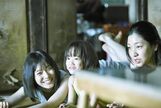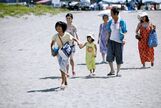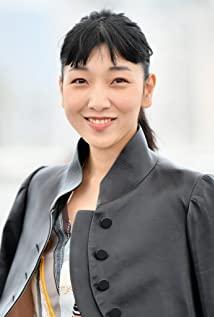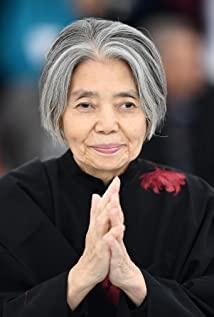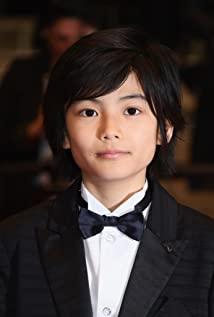When I watched "The Richest Man in Xihong City", I was deeply moved by the beauty of the city's fireworks blooming in the sky, and I felt that the lives of the rich are really different; when I watched "The Thief Family", I experienced the same experience because of the completely invisible fireworks. I was even more moved, as if I really saw fireworks as big as peony, the kind of fireworks called willows that would fall. . . The people in the play happily sighed, "I can't see it, I can't see it, I really can't see it at all." A few people crowded under the eaves and looked up at the sky. Outside of the show, I was moved again and again while thinking about how stupid it was. I thought that Hirokazu Kore-eda would switch to the gorgeous fireworks in the last shot, but from the beginning to the end, we only hear the voice like the characters in the play. We do not have the perspective of God, but this does not prevent us from obtaining happiness.
The film leaves a lot of questions, why does grandma go to the children of her husband who was robbed every year to get money without a cent, why does Aki, played by Matsuoka Moyu, give up a life and future that looks better. After "The Third Murder" tried a case-solving drama, Hirokazu Kore-eda added elements of the crime-solving drama to the home of family topics, but did not sort out the truth at the end like a normal crime-solving drama. We don't have a God's point of view, there aren't enough pieces to piece together the truth, and the film ends abruptly. This is more like our reality, we can't understand the story behind everyone we get along with, but this does not prevent us from drawing energy from each other and hugging each other for warmth.
What makes me still unforgettable is the end of the film, the little girl is lying on the balcony and looking out, what is she looking at, is it a familiar place or a strange world. It is Hirokazu Koreeda who is gentle. Even in the cruel reality and hopeless future of "Nobody Knows", he will focus on the bright sunshine at the end, but two-thirds of the whole film is full of laughter and happiness. "The Thief's Family", but the ending focused on the confused and doubtful eyes of his sister, who looked into the abyss. After going through a series of discussions on family issues, it was Hirokazu Koreeda who led the issue to a more primitive, more philosophical, and more metaphysical level - what exactly is a family. The more philosophical questions are, the more unsolvable they are, and Hirokazu Kore-eda estimated that he didn't have an answer, so he packaged the endless questions and sent them to the audience.
It is estimated that few people can describe ordinary life scenes as unique and empathetic as Hirokazu Ededa. A bathing conversation, the similar scars of two people, one big and one small, gave a reason for emotional catharsis, and gave an outlet for the grief to break the bank "I don't beat you because I like you, if I really like you, it will be tight like this. Hold you tight," Sakura Ando's Nobuyo hugged the little girl tightly in the firelight and muttered. It is said in "One Hundred Stories from the West Lane", "People do not grieve because of heartache, nor do they cry because they are sad. People are sad because they can cry, and only because they can express their sadness can they be sad." No. Everyone can run wild in the heavy rain and shout on the top of the mountain. It is already a kind of happiness and comfort to be able to murmur to a person like this. "It's money." When Yaji asked why the fake brother and sister-in-law maintained their relationship, he answered himself. For a moment, I felt Aki's sophistication beyond the age and the panic of the relationship between people under the bright smile. However, when Aki also has a man of his own, maybe he finally feels the feeling of being connected "in the heart and not there". A bowl of cold noodles in summer, a sudden kiss, brothers and sisters who came back from the rainstorm, mothers and fathers who were in a panic. The coolness of this summer is a little sudden, a little embarrassing, and a little fortunate. Happiness is like a thunderstorm in summer when it happens unexpectedly. Human nature is mixed with many factors, but it is not vulnerable. The tears flowing from the broken embankment are not only painful, but also the cheerful smile does not necessarily contain anxiety and confusion.
"A mother doesn't automatically become a mother as soon as she gives birth to a child." "But have these two children ever called you a mother?" The mother, who had been so strong to the point of being arrogant, suddenly burst into tears. Is a title really that important? Maybe this is the power of bondage. In "Unnatural Death", the heroine said that "many murders happen between relatives, because there is no choice." Like Xue Sui in "White Night", only by killing can escape from her mother's side. "You should also know that there are some things that people like us can't give." "I watched Ling grow up from the age of zero. I always regarded her as my own daughter, but suddenly one day because of a photo The email address on the paper, she suddenly said to me 'I'm going to find my mother' and left," said a character in "anone". The mother's words brought too much desolation, and only the little boy's last sentence "Dad" was able to be slightly reconciled. At the end of the film, everyone went their separate ways, as if to slap my mother in the face of the phrase "because it's your own choice, so it's stronger", but I couldn't help but imagine that if the little boy thing didn't happen, they Can they live like this forever, like a family, or are they already a family like this? It is Hirokazu Kore-eda's films that are always so moving, not because of sensationalism and gorgeousness, but because the moments of happiness under his camera are so accessible. He does not shy away from the hardships of life, but makes you aware of the happiness of life. . In a glass ball, there is the sea, the stars, and the universe.
View more about Shoplifters reviews



